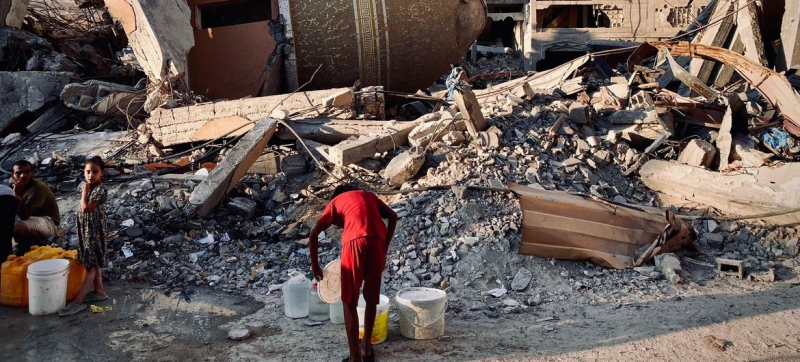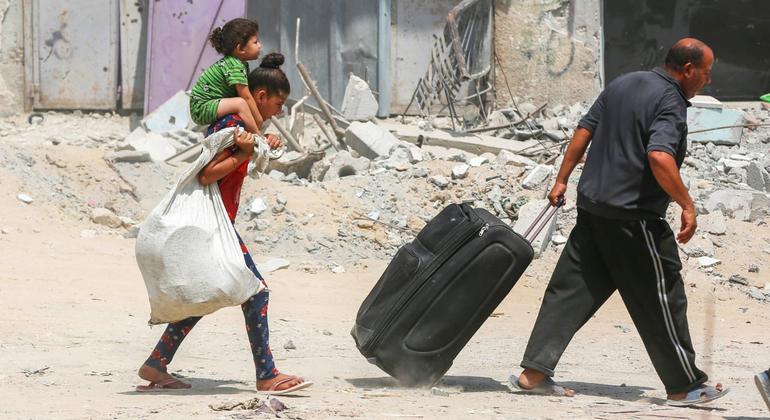
A Gaza resident collects water from among the destroyed buildings. UN Security Council meeting: Middle East heading towards escalation Peace and security
Israel’s “devastating attack” on the Al-Tabin school in Gaza City once again highlights the urgent need for a ceasefire, the release of hostages and increased humanitarian aid to Gaza, UN Under-Secretary-General for Political and Peacebuilding Affairs Rosemary DiCarlo said at a Security Council meeting on the situation in the Middle East on Tuesday.
An IDF airstrike on the Al-Tabin school complex took place early on the morning of August 10, killing dozens of Palestinians and wounding many more, including women and children.
Israel says the airstrike hit a Hamas command center in a mosque on the school grounds, killing more than 30 Hamas and Islamic Jihad militants.
Skirmishes on the Lebanese-Israeli border
“With fighting continuing across the Gaza Strip, the situation for civilians remains dire,” the UN deputy chief stressed. – Ten months after the start of the war, the threat of further regional escalation has become more tangible and frightening than ever. Skirmishes along the Blue Line continue almost daily.”
Since July 31, when the Security Council last discussed the situation in the Middle East, numerous shells have been fired from Lebanon across the Blue Line. The Israeli army responded with strikes in southern Lebanon, Dikralo reported.
The situation in the West Bank
“I also urge that attention be paid to the deteriorating situation and ongoing violence in the occupied West Bank, including East Jerusalem,” the UN Under-Secretary-General said.
On August 3, Israel carried out two airstrikes in Tulkarm, killing nine Palestinians who Israeli military officials said were planning to attack inside Israel, she said.
Another 16 Palestinians were killed in Israeli army operations in Jenin and Tubas early last week.
On August 11, a gun attack claimed by Hamas killed one Israeli civilian and wounded another in the northern Jordan Valley of the occupied West Bank.
“To stop the slide towards even greater disaster, the parties must stop escalating rhetoric and refrain from provocations,” Dikralo said. “I reiterate the Secretary-General’s call for all parties to work vigorously towards de-escalation in the region in the interests of long-term peace and stability.”
In this regard, the Deputy UN Chief welcomed the efforts of Egypt, Qatar and United States, aimed at convincing both sides to conclude an agreement on a ceasefire, the release of hostages and the provision of desperately needed humanitarian assistance.

United Nations Office for the Coordination of Humanitarian Affairs (OCHA) spokeswoman Lisa Doughten, speaking on behalf of Acting UN Under-Secretary for Humanitarian Affairs and Emergency Relief Coordinator Joyce Msuyi, said deadly attacks such as the Israeli strike on the school on Saturday were becoming more frequent.
“The evacuation orders, ostensibly for the safety of civilians, are clearly having the opposite effect,” she told the council, adding that Palestinian armed groups are reportedly using shelters and camps for displaced persons, putting those sheltering there at grave risk, she added.
Healthcare concerns
The health situation in Gaza remains critical, she said, with thousands of seriously ill patients awaiting medical evacuation and health facilities struggling to cope with the enormous needs of the population.
Acute respiratory infections, diarrheal diseases, acute jaundice and skin infections are on the rise, Doughten said. She called for urgent conditions to be created for an immunization campaign against polio, the virus of which has been detected in the environment of Gaza.
OCHA recalled that limited access and insecurity are seriously hampering the humanitarian response. In particular, new regulations by the Israeli authorities regarding the entry of cash into the enclave are significantly limiting the resources available for operations.
Doughten reiterated the urgent demands of the humanitarian community, namely an end to hostilities and respect for international humanitarian law by parties to the conflict, which includes the release of hostages and the protection of civilians. In addition, states must use all levers to prevent and end violations of international humanitarian law, including through diplomatic and economic pressure, Doughten told the Security Council members.
